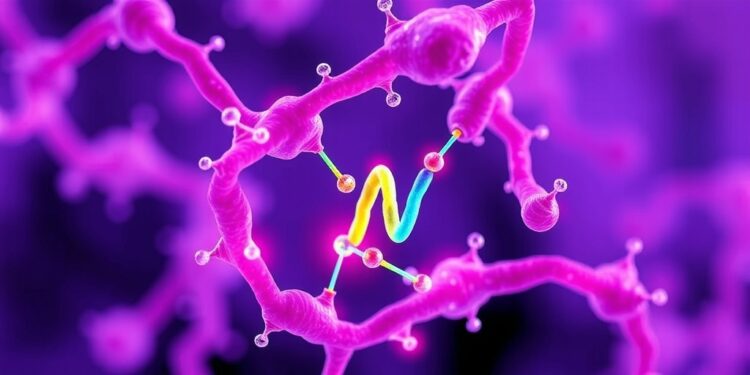Glucose: The Overlooked Regulator in Cellular Differentiation
In a remarkable breakthrough that challenges the conventional understanding of glucose’s role in cellular biology, researchers at Stanford Medicine have uncovered a novel function of glucose that extends far beyond its well-established role as the primary energy source for living cells. Their study indicates that glucose is not merely an energy supplier but also functions as a master regulator of tissue differentiation. This unexpected discovery reveals how glucose, when bound to specific proteins, can significantly influence gene expression and the differentiation process of stem cells into specialized cells, reshaping our understanding of cellular metabolism.
Traditionally recognized for its role in energy metabolism, glucose has now been found to perform a dual function that includes modulating the pathways through which stem cells mature into various cell types in the body. The compelling evidence presented in this research suggests that glucose interacts with a plethora of proteins, thereby affecting the activity and functionality of these proteins. This interaction occurs at critical junctures in cellular differentiation, marking a transformative shift in how glucose is perceived in cell biology.
The researchers, led by Dr. Paul Khavari, conducted extensive experiments with human skin stem cells differentiating into keratinocytes, the predominant cells in the outer layer of skin. Utilizing advanced techniques such as mass spectrometry and high-throughput screening, they measured the fluctuations in biomolecule concentrations throughout the differentiation process. Surprisingly, instead of observing a decrease in glucose levels—as one might expect during a phase where cells begin to slow down division—researchers observed a significant increase in glucose uptake as the differentiation process progressed.
This increase in glucose concentration prompted a reevaluation of its significance. By employing fluorescent and radioactive glucose analogs, the team was able to visualize glucose dynamics within the cells during differentiation. Notably, as the cells advanced in their differentiation journey, an increase in fluorescence indicated heightened glucose activity, suggesting that glucose levels serve as crucial signals that promote differentiation.
Further investigations revealed that the increased glucose levels were attributed to both heightened import mechanisms and diminished export processes within the cells. Notably, this accumulation did not correlate with elevated glucose metabolism, suggesting that glucose’s role as a signaling molecule is distinct from its function as a mere energy substrate. These revelations echoed throughout diverse human cell types, hinting at glucose’s potentially universal role in tissue differentiation across various biological contexts.
Intrigued by these findings, the researchers turned their attention to skin organoids—engineered tissue models intended to mimic the characteristics of native skin. In a striking experiment, organoids were unable to undergo proper differentiation when glucose levels were artificially lowered. This setback was resolved simply by reintroducing a glucose analog that could not be metabolized, reinforcing the notion that glucose’s functionality in differentiation transcends its energetic properties.
The implications of this discovery extend beyond basic biology and delve into realms such as diabetes and cancer. For individuals with elevated blood sugar levels due to diabetes, impaired healing and regeneration may be attributed to disrupted glucose signaling pathways. The findings also propose a reevaluation of therapeutic strategies targeting glucose metabolism in cancer treatment, where forcing undifferentiated cancer cells into a more mature state via glucose signaling could open avenues for innovative treatments.
Scholarly literature has hinted at glucose’s potential signaling capabilities in the past, with studies showing that embryonic stem cells lose their pluripotency when subjected to high glucose concentrations. This underscores the idea that glucose levels play a pivotal role in maintaining cellular states, particularly in stem cells whose differentiation demands precise regulatory mechanisms.
Crucially, the research team discovered that the increase in intracellular glucose levels corresponds with the enhanced production of a specific protein that facilitates glucose transport into the cell. Once inside, glucose can bind to proteins such as IRF6, a transcription factor involved in gene expression linked to differentiation. This binding triggers conformational changes that modulate IRF6’s ability to influence which genes are transcribed into proteins, effectively steering the cell’s differentiation toward a specialized fate.
In essence, this research provides a fresh perspective on how glucose functions within cellular contexts. Unlike the targeted pathways activated by other signaling molecules, glucose operates more like a broad-spectrum signaling agent, sending out signals that activate multiple cellular functions simultaneously. As levels rise in the cell, they create a systemic response that echoes throughout the cellular landscape—much like a fire alarm prompting immediate action across a community.
As the research team pushes forward, they aim to decipher the complexities surrounding glucose’s role in both healthy and diseased states. This newfound understanding could help address the complications caused by glucose dysregulation in diabetes and its association with cancer development—a condition characterized by failed differentiation and uncontrolled cellular growth.
This groundbreaking study paves the way for future research, illuminating the multifaceted roles that simple biomolecules like glucose may play in cellular processes. As the scientific community reconsiders glucose’s place in cellular biology, it becomes increasingly clear that deeper investigations into other small molecules may uncover similarly unexpected functions, broadening our comprehension of cellular physiology and its intricacies.
By revealing glucose’s critical roles beyond energy provision, we stand at the precipice of a transformative understanding that could manipulate cellular behavior with far-reaching consequences. Such insight could not only offer novel therapeutic strategies but might also redefine our conceptual frameworks for cell biology, metabolism, and health.
Subject of Research:
Article Title:
News Publication Date:
Web References:
References:
Image Credits:
Keywords: Stem cell research, Glucose, Tissue differentiation, Cellular biology, Cancer therapies, Diabetes




